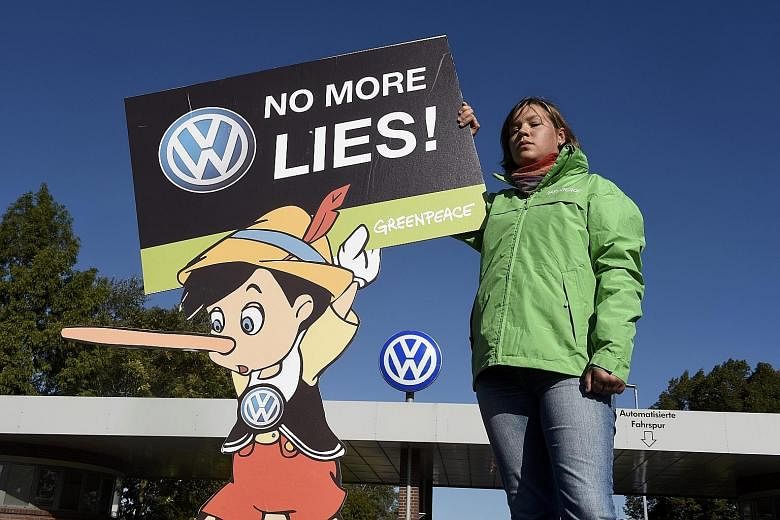BERLIN • Chancellor Angela Merkel learnt early in her political career that taking on the German car industry carries risks.
It was the spring of 1995 and the newly appointed environment minister was trying to convince her Cabinet colleagues to back a bold new set of anti-smog rules that included tougher speed limits and summer driving bans.
But Mr Matthias Wissmann, the transport minister with close ties to the industry, was having none of it.
He questioned whether Dr Merkel's measures would cut pollution levels at all and vowed to fight any attempt to impose speed limits on the Autobahn. His argument won the day, reducing Dr Merkel to tears, according to a 2010 biography by Gerd Langguth.
For the ambitious young minister from the communist East, it was a lesson about how politics worked in a united Germany.
Much has changed in the intervening years. Dr Merkel is now in her third term as chancellor. Mr Wissmann heads the Verband Der Automobilindustrie (VDA), the influential lobby group for German carmakers. But there is one constant: the clout of the car industry in German politics.
This relationship, which some describe as symbiotic, bordering on incestuous, is in the spotlight now, as Volkswagen, the country's largest carmaker, reels from an emissions scandal that has forced out its long-time CEO Martin Winterkorn and sent its stock plunging.
The authorities in Germany and elsewhere in Europe had known for years about the widening gap between emissions values measured in official laboratory tests and those recorded in a real-world environment. Yet, critics say, Berlin fought hard to shield its carmakers from closer scrutiny and, in a high-profile clash with its European partners two years ago, from tougher emissions targets.
Dr Merkel has defended the stance as necessary in order to protect jobs. Some see the VW scandal as symptomatic of a deeper problem in which German car companies have been allowed to do as they please without oversight or fear of reprisals from Berlin.
"The Volkswagen scandal is a warning shot to the politicians," said Ms Christina Deckwirth of Berlin-based Lobby Control. "It shows they need to spend less time protecting the auto industry and more time overseeing it."
There are good reasons why Berlin stands by its car companies. The industry employs more than 750,000 people in Germany. Last year, the big three carmakers, Volkswagen, Daimler and BMW, hauled in revenues of €413 billion (S$657 billion), far bigger than the German federal budget, which stood at just under €300 billion.
The VW scandal has also exposed the toothlessness of Germany's regulatory regime, opposition parties and industry experts say. The main oversight agency for the car sector, the Federal Motor Transport Authority, falls under the Transport Ministry in Berlin, raising questions about its independence and readiness to police the sector.
"The worst of all is that the automobile industry was left to do these tests themselves, there was no control," Mr Oliver Kirscher, a lawmaker for the Greens said in a debate in the German parliament last Friday.
Dr Merkel has no direct ties to the car industry. But her stance has clearly evolved since her days as an environment minister under Dr Helmut Kohl. Back in 2009, in the months before she would run for a second term, she oversaw a controversial rescue - which later unravelled - of German carmaker Opel, going against the advice of her economy minister.
Four years later, in the run-up to the next election and amid heavy pressure from the VDA, her government lobbied aggressively in Brussels - even threatening other countries in order to win their backing, according to diplomats - to water down new European rules on CO2 emissions that Daimler and BMW opposed.
"Until now, the German auto industry has been handled with kid gloves by the politicians," said Mr Klaus Mueller, head of the Federation of German Consumer Organisations. "Emissions targets were set at less than ambitious levels and agreement on new testing rules was delayed. Even worse, there was no mechanism for overseeing whether legal emissions limits were being met, at the cost of the environment and the consumer, as the VW case has now shown."
REUTERS

